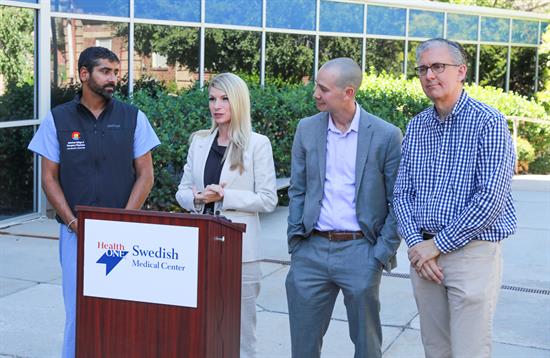WASHINGTON—Today, U.S. Representatives Brittany Pettersen (CO-07), Nikki Budzinski (IL-13), and Kim Schrier, M.D. (WA-08) introduced legislation to combat the opioid epidemic, prevent overdose deaths, and limit financial burden on patients. The Hospitals As Naloxone Distribution Sites (HANDS) Act would require Medicare, Medicaid, and TRICARE to cover the cost when medical providers physically hand naloxone to patients who are at risk of an overdose, before they are discharged, at zero cost to the patient.
Pettersen held a press conference to announce the bill at Swedish Medical Center, where her mother received treatment for a substance use disorder. To access downloadable, high quality photos of the event, click here.
“Like far too many Americans, my family was impacted by the opioid epidemic and my mom is only alive today because of overdose-reversal medication like naloxone,” said Pettersen. “I was proud to return to Swedish Medical Center – the place that saved my mom’s life before she finally got the treatment she needed – to announce the HANDS Act, alongside Dr. Stader. We are working to break down the barriers between life-saving medication and those who need it the most.”
“As communities across our country continue to face an overdose crisis, it’s critical that our hospitals and emergency rooms are empowered and have the resources necessary to dispense lifesaving mediation proactively to folks who are at risk,” said Budzinski. “I’m proud to join Congresswoman Brittany Pettersen to introduce legislation that would improve access to naloxone by ensuring that Medicaid, Medicare and Tricare can cover the cost of this lifesaving medicine when it’s distributed preventatively to folks struggling with addiction.”
“The opioid epidemic, and the impact of fentanyl on our communities, is a historic public health crisis that has impacted every part of our nation. As a mother, a pediatrician, and a congresswoman I am concerned and know this issue needs to be addressed from every angle, and that includes at the federal level,” said Schrier. “This bill will also allow for patients to acquire naloxone from Emergency Departments nationwide, closing the barriers of cost and access for this life-saving medication for patient populations that need it most.”
"I want to thank Rep. Pettersen for her leadership and vision in introducing the HANDS Bill. As an emergency and addiction medicine physician, I cannot overstate how urgent the need is to address the opioid crisis and find systematic solutions to the problems our patients are facing,” said Don Stader, MD, FACEP, Executive Director of the Naloxone Project. “The HANDS Bill will empower the medical system to better care for patients at risk of overdose, and create a system where every one of America's over 6,000 emergency departments can dispense naloxone. It will make care more equitable, more effective and will save lives."
"Improving access to naloxone saves lives and gives patients who have overdosed a new opportunity to continue on their path to recovery," said Christopher S. Kang, MD, FACEP, president of ACEP. "Eliminating barriers to this life-saving drug is a critical part of our efforts to combat the growing opioid and substance use disorder crisis. ACEP is grateful for Rep. Pettersen's leadership on this important legislation."
“The American Society of Addiction Medicine (ASAM) strongly supports broadened accessibility to safe and effective opioid overdose reversal medications for people who use opioids or unregulated drugs and other individuals in a position to initiate early response to evidence of opioid overdose,” said Brian Hurley, MD, MBA, FAPA, DFASAM, president of ASAM. “ASAM applauds the introduction of the HANDS Act, which will provide no-cost Medicaid, Medicare, and Tricare coverage for the preventive distribution of opioid overdose reversal drugs for patients at risk for an opioid overdose as they leave hospitals, emergency departments, and surgical centers across the country.”
Click here for the full text of the bill.
Inspired by her own mother’s struggle with a substance use disorder, Pettersen has been leading the fight against the opioid epidemic for a decade in the Colorado state legislature and now in Congress. Since January, she has introduced measures to combat this public health crisis and address everything from the import of synthetic opioids like fentanyl, thefinancing of drug cartels, expanding access to treatment, and preventing overdose deaths by ensuring airplanes, law enforcement, and–with the HANDS Act–hospitals are able to distribute naloxone when necessary.



